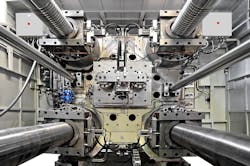IPG Supplying HPDC Machines for Expanding Chinese Group
A Chinese manufacturer of aluminum-alloy components for elevator and escalator systems (e.g., escalator steps, elevator comb plates, handrails) ordered two high-pressure diecasting machines from ItalPresseGauss, part of the Norican Group. The TF 2800 HPDC machines will be delivered later this year to the Nantong Jiangzhong Photoelectricity Co. plant in Jiangsu province, signalling its preference for the toggle-free HPDC processes pioneered by ItalPresseGauss.
IPG’s TF machines offer a smaller footprint, greater rigidity, and fewer wear parts than typical diecasting processes with mechanical designs, improving system reliability and performance.
The TF (for "toggle free") series machines were developed by IPG with a hydraulic drive for the press closing action. An initial advantage to hydraulic power is that the machine needs just two platens (not three) to achieve the necessary pressure, which reduces the machine footprint. That point is important because producing larger-dimension parts calls for a higher reliance on automation and handling equipment to tend the HPDC process.
Also, the toggle-free design reportedly is well-suited to high-volume production (e.g., in automotive or industrial supply programs), as well as to operations that may require frequent die changes.
In 2021 Jiangzhong became the first Chinese manufacturer to order ItalPresseGauss’ TF5700 HPDC machine – a toggle-free machine capable of producing large-dimension parts for the escalator market, and to serve new opportunities for structural castings.
“These lean and highly efficient TF machines do not simply deliver extra working capacity,” according to Jiangzhong chairman Xu Yinglong. “They give us flexibility. With larger cast parts becoming an increasing focus of production, the two new machines – plus the TF5700 – mean we have an incredibly adaptable casting facility equipped with the range of clamping forces necessary to accommodate the needs of an evolving marketplace.”
Other advantages to the TF design are the absence of a connecting rod system and reaction platen, which reduces the number of parts requiring service. Larger and shorter tie rods give the machine high rigidity, promoting better die closure, which improves casting quality and minimizes scrap material.
IPG has previously noted that the toggle-free process is flexible thanks to four independent screws that make it possible to offset any geometric imperfections and thermal expansion in the die as product and process conditions change.
IPG offers its SC 3.0 shot-end system to control the shot process for TF machines, which maintains process consistency and repeatability, ensuring high-quality castings.
Jiangzhong also ordered its third StrikoWestofen Westomat dosing furnace, a 2300S, to integrate with the HPDC machine – creating a fully automated process. This follows the purchase of two Westomat furnaces last year.
The new machines will bring the Jiangsu operation to a total of ten diecasting lines as it works to raise production capacity to approximately 1.2 million sets of elevator parts per year. The increase also will help Jianzhong expand its research and development activity, and its production of oversize parts for automotive manufacturing.
